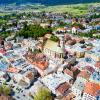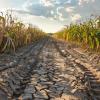
Elena Rovenskaya, Program Director of Advancing Systems Analysis (ASA) delivered a keynote presentation on the best practices, policies, and infrastructures being developed to promote open science in a interdisciplinary research context at the workshop organized by Vienna Science and Technology Fund (WWTF).
On 11 September 2023, WWTF invited IIASA to contribute to its workshop “Opening Research Data: Building a WWTF Position” held at the University of Vienna. As both the richness and volume of data useful for scientific endeavors increase, policies, institutions, and norms to regulate their effective and equitable use must keep up. In recognition of this, the WWTF workshop was held with the aim to advance a common understanding among scientists and research institutions based in Austria and funded by WWTF on their approaches to data stewardship and open science.
During her keynote address, Rovenskaya emphasized the importance of fostering a collaborative environment that encourages the sharing of research data across disciplines. She highlighted the integral role diversity of data plays in facilitating a diversity of research questions. She noted that interdisciplinary research is indispensable to developing systems-based, holistic solutions to address complex global challenges, stressing that open science and data sharing are essential components of this collaborative approach.
Rovenskaya presented examples of IIASA’s own activities to promote data sharing and stewardship. As a signatory to the Berlin Declaration on Open Access to Knowledge in the Sciences and Humanities, IIASA is committed to providing unrestricted and cost-free online access to its output for all. Accordingly, IIASA’s research and publications are made publicly available through the IIASA publications repository PURE. In the research domain, the Novel Data Ecosystems for Sustainability (NODES) research group within the ASA Program, for example, mobilizes tools of citizen and data science combined with Earth observations to enable monitoring progress toward the 17 United Nations Sustainable Development Goals where other data sources are not available.
In her presentation, Rovenskaya emphasized the need for a synergistic ecosystem of infrastructures and policies to strengthen an institutions’ oversight and commitment to open science. For example, IIASA’s multifaceted approach: promoting effective data stewardship and commitment to Open Science as per the IIASA Strategy 2021-2030, its Research Plan 2021-2024, and its Open Access Policy (also for Models and Tools); data management through complying with General Data Protection Regulation (GDPR) and use of FOG computing systems; data stewardship by appointing a data steward in each of its six programs; and promoting access by incentivizing open-access output from researchers through targeted Performance and Impact metrics and compliance with FAIR (Findable, Accessible, Interoperable, Reusable) principles using PURE and Zenodo as well as datasets available on its website. Lastly, effective data stewardship is only made possible with the contributions of internal stakeholders including the departments of Library and Knowledge Resources, ICT, Communications and External Relations, the various Data Stewards, and the Institute Data Coordinator.
In her own work, Rovenskaya is a member of the Executive Committee of CODATA, which, as a Committee on Data of the International Science Council (ISC), seeks to promote global collaboration to improve the availability and usability of data for all areas of research.
The workshop facilitated a robust exchange of ideas, with participants sharing their experiences and lessons learned in implementing open science initiatives. Participants recognized the importance of aligning policies with technological advancements to ensure that data remains accessible, while also addressing ethical considerations associated with data sharing. We thank WWTF for facilitating a platform for fruitful discussions.
To read more about IIASA’s Open Science Policy, click here.
To see Rovenskaya’s presentation, click here.
To read more about CODATA, click here.
News

11 March 2025
IIASA provides insights on research, technology, and innovation to Austrian federal states

05 March 2025
Co-creating a stakeholder-oriented climate risk service in Austria

25 February 2025
